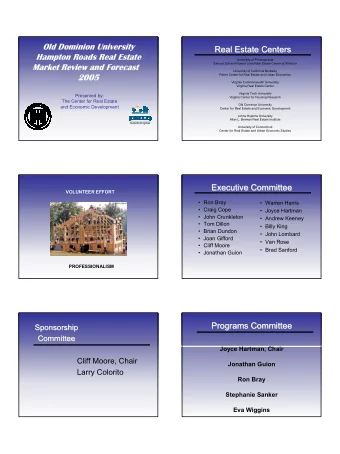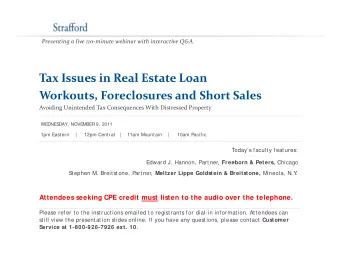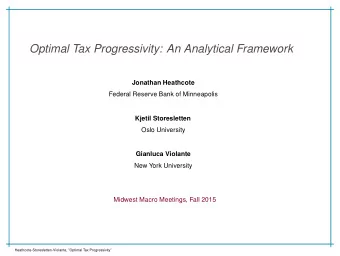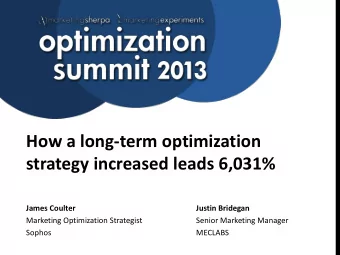
The New French Real Estate Wealth Tax STEP Lunch Meeting / Lausanne, - PowerPoint PPT Presentation
The New French Real Estate Wealth Tax STEP Lunch Meeting / Lausanne, 2 nd October 2018 Frederic Mege London, 28 November 2017 Frederic Mege I am a dual-qualified French and English private client lawyer (Avocat/Solicitor) I am a
The New French Real Estate Wealth Tax STEP Lunch Meeting / Lausanne, 2 nd October 2018 Frederic Mege London, 28 November 2017
Frederic Mege • I am a dual-qualified French and English private client lawyer (Avocat/Solicitor) • I am a member of the Paris Bar Association, the Institut des Avocats Conseils Fiscaux (IACF), the Society for Tax and Estate Practitioners (STEP) and the Law Society (England & Wales) • I have many years of experience in advising private clients on personal tax and other legal issues M +336 2435 5637 • E fmege@mri.mc Before joining Moores Rowland, I was an associate then Partner in the Private Capital Team at Gowling WLG (ex www.mri.mc Lawrence Graham) from 2008 to 2017 • I began my career with Arthur Andersen in Paris. I then moved to London and worked at BDO Stoy Hayward LLP and Grant Thornton LLP in their private client tax departments 2 London, 28 November 2017
Introduction • The 2018 French Finance Act abolished the former wealth tax and introduced a new wealth tax on real estate ( impôt sur la fortune immobilière ) • On 8 June 2018, the French tax authorities issued their tax guidelines but they do not necessarily help to clarify all the current uncertainties regarding the application of the new legislation • The legislation carries considerable implications for non-French tax residents. Let us consider them London, 28 November 2017
Scope • Non-French tax residents are subject to tax on their French situs real estate only. But but not on all real estate; only French real estate which is not used for the purposes of a business activity is treated as a taxable asset • Unlike the former Wealth tax, any other assets located in France are excluded from the scope of the tax (e.g. furniture located in a French property, a French registered car or boat etc) • The tax applies to French residential properties owned directly by the taxpayer and also owned indirectly through a French or foreign company or entity (regardless of the number and the location of the companies or entities in the chain of ownership) • As for Wealth tax, taxation applies if the net value of the taxable asset exceeds the threshold of €1,300,000 • Let us see now how to determine the net taxable value? London, 28 November 2017
Direct ownership (deductibility of debts) • Article 974 I of the FTC provides for a general condition of deductibility of debts. In order to be deductible, a debt must, as previously, be linked to a taxable asset; exist as at 1 January of the tax year; and be at the personal charge of the taxpayer. Debts must also be substantiated • There are no other conditions regarding the deductibility of debts. In particular, there is nothing in the French tax legislation which says that to be deductible, a debt in the form of a bank loan, must be secured by a mortgage over the property it finances • The legislation also confirms that only debts incurred for the acquisition, improvement, renovation, construction and renovation of taxable real estate may be allowed as a deduction • The new legislation provides for more restrictions on the deductibilty of debts London, 28 November 2017
Direct ownership (deductibility of debts) Interest-only loans • They are no longer fully deductible. The legislation provides for a formula to be used to determine the deductible annuities of the loan • Each year the deductible annuity of the loan is given by the following formula: Amount of the loan – (amount of the loan x number of years that have expired since the payment of the loan / total years of the loan) • This restriction applies in respect of loans already in place on 1 January 2018 London, 28 November 2017
Direct ownership (deductibility of debts) Family loans • Loans taken directly or indirectly from the taxpayer or a member of his tax household are not deductible without exceptions • Loans taken from another member of the family of the taxpayer can be deductible if granted under normal conditions London, 28 November 2017
Direct ownership (deductibility of debts) Global limitation • There is a limitation on the deduction of loans when the value of the taxable asset exceeds €5,000,000 and the amount of the loan exceeds 60% of the taxable value. The part of the loan exceeding this limit would only be deductible to the extent of 50% • For instance, an individual purchases a property for €8,000,000 with a loan of €6,000,000. The loan exceeds 60% of the value of the asset, i.e. €4,800,000. The part of the loan exceeding this amount (i.e. €1,200,000) would only be deductible for an amount of €600,000. The total amount of the loan which would be deductible would then be equal at €5,400,000 • This limitation does not apply if the taxpayer can prove that the loan has not been created mainly for a tax purpose London, 28 November 2017
Indirect ownership (valuation of company shares) • When a property is owned by a company (or entity) the shares are only taxable to the extent that their value is attributable to real estate assets or rights held directly or indirectly • The taxable value of the shares is given by applying to the value of the shares the following ratio (called the real estate ratio): Market value of the property Shares value x -------------------------------------------------------------------- Market value of all the company assets • In case of chain of ownership , the ratio must be determined at each level of ownersip • The ratio is then applied on the market value of the shares London, 28 November 2017
Indirect ownership (valuation of company shares) • Real estate ratio in the SCI: M€15 / M€20 x 100 = 75% HOLDING • Real estate ratio in the holding: M€15 / M€30 x 100 = 50% SCI • Taxable value of the shares : M€30 x 50% = M€15 Swiss Property € M€10 French property French movable M€15 assets M€5 London, 28 November 2017
Indirect ownership (valuation of company shares) • When determining the market value of shares (to which the ratio applies), Article 973 II of FTC provides a list of debts which cannot, in principle, be taken into account. These debts are as follows: • Loans granted for the acquisition of real estate from the taxpayer or a member of his tax household when the company purchasing the property is controlled by the same taxpayer or a member of his tax household • Loans from the taxpayer or a member of his tax household. This restriction would seem to include the previous exclusion of shareholder loans • Loans made by a company or entity directly or indirectly controlled by the taxpayer on his own or together with members of his family (spouses, children, parents and brothers and sisters) • These restrictions only apply to debts created as of 1 January 2018 and do not apply if the taxpayer can prove that the loan has not been granted mainly for a tax purpose (“ objectif principalement fiscal”). This subjective concept will probably raise issues in the future London, 28 November 2017
Indirect ownership (valuation of company shares) • Article 973 II of the FTC provides for another restriction in respect of loans made by another family member of the taxpayer (outside his household) unless the loan has been granted under normal conditions • As we can see the legislation is open to particular situations to avoid the application of the various restrictions. This might lead to some tax planning opportunities when structuring debts • The legislation only refers to debts which have been used to purchase a French taxable asset. Debts granted for other purposes do not seem to be covered by these restrictions London, 28 November 2017
Indirect ownership (valuation of company shares) Under the new legislation, the use of a company which owns other assets in addition to the French real estate should help to reduce the tax liability on the French real estate • Total assets: M€20 (ratio = 75%) Bank loan M€5 • Total debts : M€13 M€8 • Company Net value of the shares : M€7 • Taxable value: €5,250,000 (M€7 x 75%) Movable assets M€15 M€5 London, 28 November 2017 13
Indirect ownership (valuation of company shares) How shareholder loans should be treated? • Under the former Wealth tax legislation, shareholder loans made by non French tax resident shareholders to French or foreign companies owning French real estate were not taken into account when assessing the net value of the shares in the company for Wealth tax purposes • Now Article 973 II of FTC provides that loans from the taxpayer to a company are not deductible • However this exemption does not apply if the taxpayer can prove that the loan has not been granted mainly for a tax purpose (“ objectif principalement fiscal”) • In their guidelines the French tax authorities consider that the fact that the debt (the shareholder loan) existed before 2018 can be an element to demonstrate that the debt has not been granted mainly for a tax purpose London, 28 November 2017
Recommend
More recommend
Explore More Topics
Stay informed with curated content and fresh updates.






















